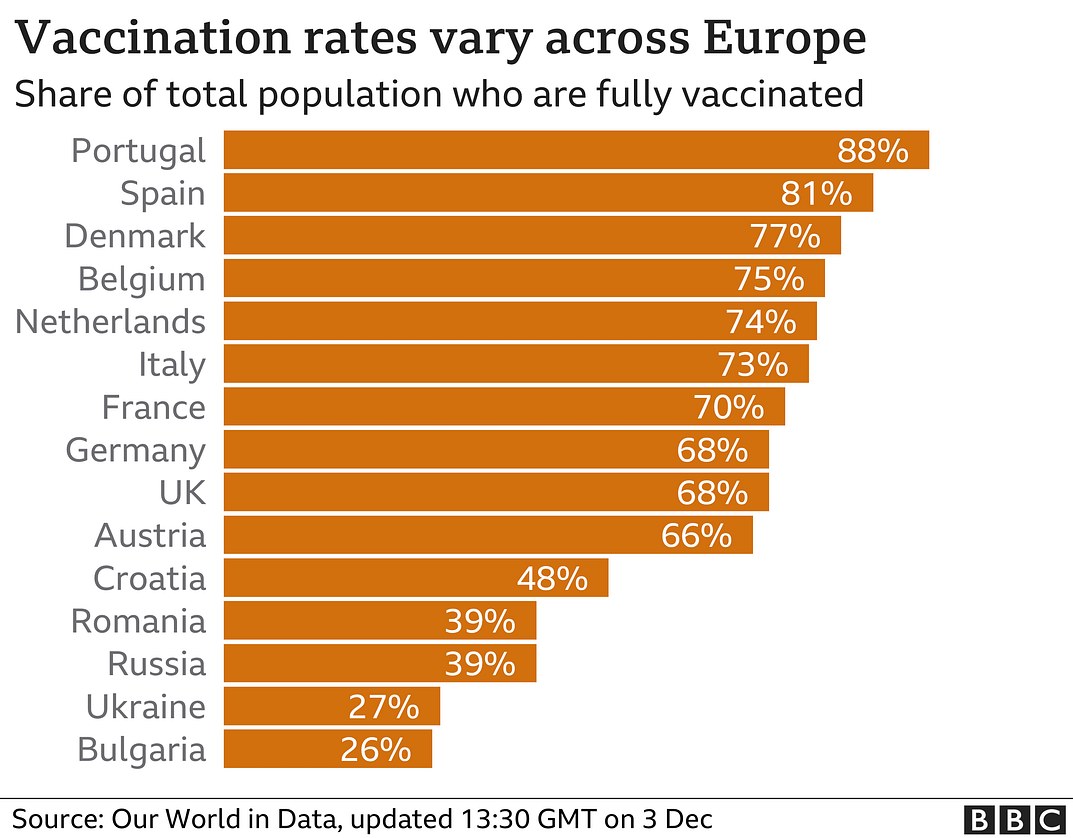Nearly two years since Chinese doctors first observed mysterious new cases of pneumonia, Covid-19 is still with us.
On top of that, what has been described as the most worrying variant yet has emerged.
Could mandatory vaccinations be a way out?
BBC News
By Thom Poole
December 4, 2021
Covid vaccinations are already a requirement for public life in many parts of the world.
If you are a French doctor, a New Zealand teacher or a Canadian government employee, getting your shots is essential to go to work. Indonesia can deny benefits to people who refuse jabs. Greece is making them compulsory for the over-60s.
Austria is set to go further still, with a plan to introduce mandatory vaccinations for all by February.
This would not mean Austrians being forcibly injected. There will be medical and religious exemptions. But the bulk of the remaining unvaccinated population face fines for not getting their shots.
With Germany planning a similar move it is not a debate that is going away. I spoke to public health and other experts to get a sense of what’s at stake.
Summary :
- FOR: Vaccines save lives
- AGAINST: There will be resistance
- FOR: We’ve exhausted other options…
- AGAINST: …or maybe not just yet
- FOR: End the cycle of lockdowns
- AGAINST: It could prove counterproductive
FOR: Vaccines save lives
There’s a very simple argument in favour of mandating Covid-19 vaccinations. By getting vaccinated you reduce your risk of serious illness. Less serious illnesses mean fewer deaths, and less pressure on hospitals.
Historically, immunisation campaigns have seen huge success, eliminating diseases like smallpox or drastically reducing mortality levels in others.
“We have really good examples that just show a direct causal relationship between requirements, getting very high vaccination rates, and protecting not just individuals but protecting communities,” says Jason Schwartz, an associate professor in the History of Medicine at Yale University.
“ Vaccines work, they absolutely work, we’re got a large body of evidence to show that.”
Mandates softer than the one proposed by Austria have achieved their goal of raising vaccination levels. France’s pass sanitaire, required to access restaurants and other public spaces, is credited with boosting rates to the extent the government hopes it can avoid compulsory vaccinations.
AGAINST: There will be resistance
Here in London, in July anti-lockdown demonstrators took to the streets to demonstrate against a lockdown that had been lifted just hours earlier.
The point is, whatever a government does, it will face opposition. Covid restrictions in particular have drawn protests around the world and mandatory vaccinations are a step beyond, say, a mask mandate.
“When it comes to vaccines, people do think very differently,” says Vageesh Jain, a public health doctor at the Institute for Global Health at University College London.
“Anything that’s administered to them in their body, it’s not going to be thought of in the same way, even though academics and others may think theoretically it’s just a restriction, people do have this kind of emotive response.”

While there will always be some who will never be persuaded to get vaccinated, it is possible to be sceptical about vaccinations without being an anti-vaxxer.
An Austrian study distinguished between the 14.5% of the country’s 9m population who were unprepared to get vaccinated and the 9% who were simply hesitant.
Governments must weigh whether the benefits outweigh the backlash. But as Cathleen Powell, a law professor at the University of Cape Town, argues, there is a legal case to be made.
“The right to bodily integrity as a person who doesn’t want to be vaccinated, who wants to make his or her own choices about what medical treatment to get, comes up directly against the rights of other people, not to be infected with potentially fatal diseases,” she says.
FOR: We’ve exhausted other options…
Covid has been with us for some time, but then so have vaccines.
In Europe at least, the momentum behind mandates reflects a frustration that after months of vaccinations and widespread availability there remain significant unvaccinated populations.
There’s a stark difference in vaccination rates across the continent from west to east.

European Commission chief Ursula von der Leyen said it was now time to think about mandatory vaccinations, although she stressed individual governments would decide.
“We have the vaccines, the life-saving vaccines, but they are not being used adequately everywhere,” she said.
AGAINST: …or maybe not just yet
While there is a strong health argument in favour of mandatory vaccinations, it is not the only way to boost levels.
“What is quite noticeable in the past is how politicians do like the idea of mandatory vaccination because it seems to give a quick answer to the problem,” says Samantha Vandeslott, a social sciences researcher at the Oxford Vaccine Group.
“I wouldn’t want government to neglect other things that need to be done to make sure that people really have access to vaccines.”
Austria won’t be making vaccines mandatory until February and is still using other means. “For those who are afraid, who have no trust, for those whose assessment of risk is low — for them it is important that they are listened to and that their concerns are taken seriously,” Barbara Juen, a health psychologist at the University of Innsbruck, told national broadcaster ORF.
In South Africa, 24% of the population is vaccinated, less than half the European average but considerably higher than the 7% average recorded across the African continent. There’s no shortage of jabs and low take-up has been blamed in part on misinformation.
The government has floated making vaccines compulsory in some circumstances, but the number of vaccines administered has risen rapidly since the discovery of the Omicron variant. It’s not just governments that provide nudges.
FOR: End the cycle of lockdowns
Compulsory vaccinations are not the only form of mandate. Most governments have imposed some form of restrictions, from Covid passes to travel bans, that carry their own costs.
On top of the lives saved, a blanket vaccine mandate could spell the end of lockdowns.
“It’s not just about having your liberty changed… it’s about economic damage and the mental health damage the physical health damage,” says Alberto Giubilini, a senior research fellow at the Oxford Uehiro Centre for Practical Ethics. He favours mandates for those most vulnerable to coronavirus.
“There is no reason to impose the huge, huge costs of lockdowns on people when you have another measure available.”
AGAINST: It could prove counterproductive
Some have more long-term concerns, such as whether a successful programme could build distrust of future campaigns.
“When people have what we call conspiracy theories or they have misbeliefs or misunderstandings, [such schemes] will only strengthen their opinions.”
Vandeslott points to the political climate: “We have witnessed, especially in Europe, parties tapping into the vaccine opposition and knowing that that might be a way to get votes from a certain section of the population,” she says.
“We could see more parties, and they tend to be on the right, putting out that kind of message in their political campaign and saying that they want to remove measures for mandatory vaccination. That’s a fear and then once that happens, we don’t have the option anymore to use that as a policy measure.”
Originally published at https://www.bbc.com on December 5, 2021.








